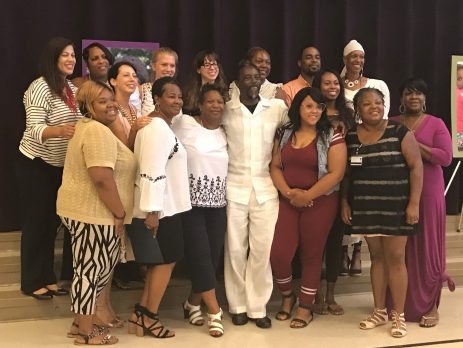FOR IMMEDIATE RELEASE–July 16, 2020
Home Tips to Keep Families Healthy
As families enter their fourth month home with children, the DC Healthy Housing Collaborative (DCHHC) knows one of parents’ top concerns is how to keep homes clean and pest-free. For parents of children with asthma, this can be even more concerning. The more time their child is exposed to asthma triggers in the home, the more likely the child may need to go to the hospital at a time when that can cause an increase in COVID-19 exposure.
To respond to these concerns, the Collaborative developed a suite of materials to help families take small steps to keep pests out of the home and reduce the presence of other allergens that can trigger asthma.
“We know families are facing a lot of stress and worry right now,” said Dr. Janet Phoenix, MD, MPH of the DC Asthma Coalition. “Our hope is these resources offer a few simple steps that make everyone in their home breathe a little easier.”
The relationship between poor housing conditions and certain health problems such as asthma and lead poisoning is well-documented. In D.C., one’s race, income, and neighborhood too often predict the potential for poor housing conditions that can negatively influence health.
In the videos, Children’s Law Center family outreach worker, Kayla Brandon, walks viewers through two tutorials, one focused on how to take small steps to keep asthma under control in a home and the other on how to keep mice and roaches away.
The resources are being shared with nonprofit partners and medical providers so that families, especially those who have asthma, can keep on top of housing issues during a time when landlords may not be able to fix them quickly or easily.
For more information and to access these resources, visit http://bit.ly/DCHealthyHousing.
###
About the DC Healthy Housing Collaborative
The DC Healthy Housing Collaborative is a multi-sector coalition seeking to address substandard housing conditions that contribute to significant health issues affect District of Columbia residents.
The relationship between poor housing conditions and certain health problems such as asthma and lead poisoning is well-documented. In D.C., one’s race, income, and neighborhood too often predict the potential for poor housing conditions that can negatively influence health. The DC Healthy Housing Collaborative (DCHHC) convenes a broad range of partners representing government agencies, healthcare, public health, health insurance providers, housing services, legal services, policy advocacy groups, financial institutions, and many others, united in pursuit of policy and systems changes that will lead to healthier housing conditions. IPHI is a core member of the DCHHC and serves as the Collaborative’s backbone organization.
We envision a DC where all housing promotes health, wellness, safety, and is affordable. DC will be a city where all are welcome and can thrive in powerful resilient and well-resourced communities.
Members include AmeriHealth Caritas District of Columbia, DC Asthma Coalition, Children’s Law Center, Coalition for Nonprofit Housing and Economic Development (CNHED), IMPACT DC (Children’s National Hospital), Institute for Public Health Innovation, Local Initiatives Support Corporation (LISC DC), and Yachad.
For more information on the DC Healthy Housing Collaborative, contact Abby Charles, Program Director at the Institute for Public Health Innovation, at [email protected].
